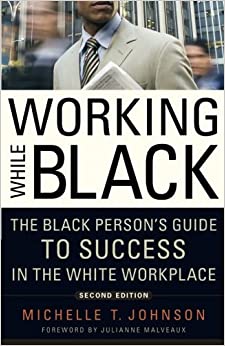Trying to be anti-racist takes work, and the first step of that work is to educate yourself about systemic racism, and what people (particularly people of color) experience in their day-to-day life. And, as I’ve said in other places, it’s not up to our black colleagues to teach us about racism. They can be our partners, but it is our responsibility.
This section is written with the primary purpose of helping white/Caucasian people start the process to learn about race, but the lessons can apply to people of other races too.
Below is a list of books, that I recommend. This is not a complete list and there are many good books on the subject. If you want to start with a book not on the list, great. But if you don’t know where to start…here you go.
Also, I am not providing links, but most of these books can be purchased from your local bookstore.
A Glimpse of the Black Experience

Working While Black: The Black Person’s Guide to Success in the White Workplace – Michael T. Johnson
This was the first book I read in this space and it really opened my eyes. As a manager, and employer, I swore that I would do everything I could to remove this tax from my Black employees.

I’m Still Here: Black Dignity In a World Made for Whiteness – Austin Channing Brown
I just finished this book recently, but it was great. Where Working While Black focuses on the working experience primarily, this book covers a broader array of topics. Oh yeah, look at the author’s name. She is actually a black female. You may not have guessed that when you saw the name Austin.

Uncomfortable Conversations with A Black Man – Emmanuel Acho
This is a fairly new book, and there is a YouTube series to accompany the text. In my opinion, the book is vastly superior to the videos and definitely worth your time to read. While both teh books and the videos do a good job of contrasting the white and Black experience, the book goes much deeper into the issues of incarceration, voting, and other important topics.
The Known Titles – that are still really good

How To Be An Antiracist – Ibram X. Kendi
This book in many ways started a movement. Two things this book does really well are 1) making the case about why assimilation isn’t enough (why being color blind isn’t enough) and 2) separating the issues of race and class.

White Fragility: Why It’s So Hard for White People to Talk About Racism – Robin DiAngelo
There has been so much written about this book, that there is no reason to try to add to it here. If you are new to this topic, be warned, DiAngelo does not pull punches.

Journeys of Race Color, & Culture – Rick Huntley, Brianna Moore, Carol Pierce
You have to search for this book by name and then buy from the authors directly, but this is an excellent book to understand the pathway antiracism tends to follow and what that looks like for both white and Black individuals.
Understanding That There are Multiple Perspectives

On Looking: Eleven Walks With Expert Eyes – Alexandra Horowitz
By covering the same path in NYC with 11 different people, the author reveals how the same scenery can look and feel very different to different people. A toddler, a blind person, and an orthopedic surgeon experience the same things very differently.
While not specifically on antiracism, this is a good book to help people understand that the way each of us individually perceives the world can vary dramatically from others. While this book covers perceptions well it doesn’t address how the world treats people differently, and that is a huge component that cannot be forgotten. If you want to jump into antiracism, then I’d save this for later in your reading pursuits.
Short Essays that are Worth your Time
Here are some shorter reads that you should have in your knowledgebase.
Ain’t I a Woman – Sojourner Truth – This speech was delivered in 1851, but even today, we have research demonstrating that the experience of black women in the workplace is very different than the experience of white women. Fewer opportunities and less support from their bosses is the norm for black women.
Unpacking the Invisible Knapsack – Peggy McIntosh – To respect the author’s wishes that this not be directly linked, I’ll recommend that you search for the title. The document is easy to locate and is one of the seminal works on white privilege.